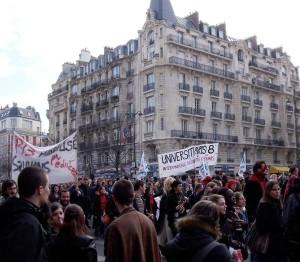Georgetown students studying abroad in France still face class cancellation and confusion as professors and student unions continue their strike, which began in late January.
The strikes began in response to a new policy – aimed to improve the quality of academic research by empowering a university’s president to evaluate the faculty – created by the Ministry for Higher Education. According to The Independent, a British newspaper, many professors and student unions saw this move as a threat to their academic freedom.
Georgetown students attending the University of Lyon 2 have had to monitor the strikes closely in order to attend classes because the teachers and students may not protest every day. The student unions hold General Assemblies twice a week to decide if the protesting will continue. According to Jason Sanderson, an overseas studies adviser for the Office of International Programs, none of the universities in Paris that Georgetown students attend were affected by the protesting. The Independent reported, however, that most universities throughout France are somehow affected by the strikes, with two universities in Montpellier closing this week due to student barricades.
Emily Hart (SFS ’10) said she is very concerned about whether or not she will receive credit for her classes this semester.
“Miserable might be a bit much, but it is hard to be sympathetic when you are worried about when classes will start again and what exactly is going to happen, credit-wise, and also class-time-wise,” she said. “In theory, you don’t always know if your professor is striking or not, so it’s easy to waste a lot of time showing up to an empty classroom.”
According to Sanderson, the process is ongoing and OIP is trying to stay up to date on protests overseas.
“The government has made concessions to appease those striking at the universities, but most professor and student unions have yet to respond favorably. Also, [yesterday] there was a second general strike against the government’s response to the current economic crisis,” Sanderson said. “And the outcome of this strike may well have an impact on the situation at the universities, but this will not likely be known until next week.”
Georgetown did, however, begin to offer substitute classes for study abroad students in mid-February.
“We have been in regular contact with our partners in France since the beginning of the strike and all of those who have been affected by canceled classes have taken measures, primarily in the form of substitute classes and tutorials, to assure that visiting students can complete a full semester worth of classes,” Sanderson said.
Two substitute classes are offered – Comparative Political Systems: France and the U.S. and History of Franco-American Relations – each meeting once a week. According to Sanderson, these classes will continue until the end of the term, regardless of whether or not the strikes continue.
Despite the efforts of Georgetown and its partners abroad to assure students that they will indeed earn sufficient academic credit, some students remain concerned.
“I have been reassured that I will receive the proper credit. It’s hard to understand how Georgetown will make this all work though. I’m actually more concerned about how the French university intends to make up the classes and whether or not the calendar year could get extended,” Hart said. “As exchange students, we were reassured that we would not have to stay longer than originally planned, but the idea of Saturday morning classes and taking an earlier exam in the midst of make-up classes is not exactly a pleasant thought.”
Whether or not these substitute credits will apply to an intended major is an issue currently being discussed by students and their curricular deans, Sanderson said.
He added that when Georgetown students apply to study abroad they are not cautioned that they could face situations that would prevent the completion of their education.
“As far as institutional memory goes, there has not been a situation where a political movement . prevented students from finishing their semester overseas. As these situations are never predictable, we do not issue such warnings,” Sanderson said. “In fact, Georgetown would not endorse a program if there were doubts about whether or not a full semester of credit was possible. Whenever a situation arises that affects classes, we are committed to working closely with our partners to ensure that students are able to get a full semester worth of credit for the coursework they complete overseas.”
Hart said OIP has done as much as they can do from a removed position.
“They don’t know what will happen with the strikes anymore than we [students] do, so they just have to wait and see like everyone else,” he said. “I don’t regret studying abroad, but there are some days when I don’t have classes when I wonder if my time could have been better spent at Georgetown or with a different program.”
“








